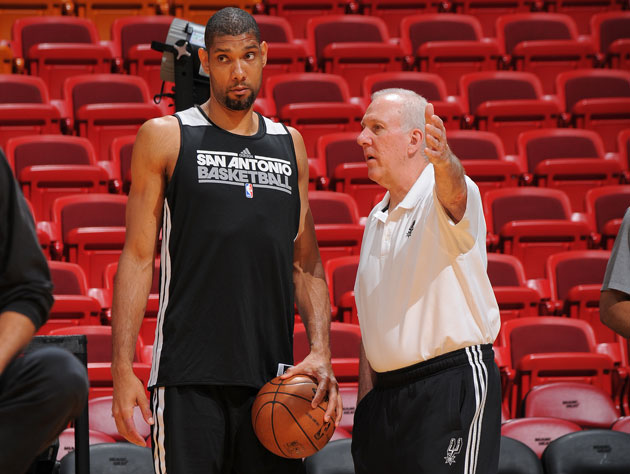
The San Antonio Spurs’ system – its routine – has been lauded for years for providing consistent season after season of mindful, winning basketball. The team has been able to mix equal parts adaptability and attention to structure on its way toward four NBA championships, and that system seemed well on its way to a fifth banner in Tuesday’s Game 6 of the NBA Finals before coach Gregg Popovich decided to pull Tim Duncan in the game’s final minute so as to match up with the Miami Heat’s smaller lineup.
A five-point lead quickly evaporated into a tie ballgame, though, as the Heat crashed the offensive boards after two bad three-point misses to reconfigure and toss in two killer treys in the game’s final seconds, as Duncan watched from the sidelines. To hear the Spurs tell it on Wednesday, the lineup was normal, to be expected, and set to return should the same context spring up in Game 7.
Here’s Tim Duncan on the Spurs’ late-game approach in Game 6, via ASAPSports.com:
Not new at all. Something we've done all year. Obviously we were trying to protect the three‑point line. We had a lot of bodies in there to switch and get up on our shooters. Two bad bounces off a rebound, we actually get the stops on the threes and bad bounces right back out for threes.
It is what it is. Obviously, I want to be in there every minute of the game. That's just how we're built. But we've done it all year long. We've been successful with it. And if it comes down to it again, Pop will make the call again.
Pop, earlier in the afternoon, said as much:
It's not that simple. That's not why they got the threes. We were up five when they got their first three. And so reading and switching makes sense just to take away the three.
But on an offensive rebound, it's one of the toughest things in the NBA, to pick up people. And we had one guy who didn't pick up. LeBron shot an air ball, when we were up five. They got the rebound, they got it back to him and he knocked it down.
And then on the last possession we were switching at the three‑point line to take away the three, and Boris Diaw has a little more speed than Tim Duncan, so it makes sense to have him out there reading at the three‑point line. Unfortunately we had two guys that went to LeBron and didn't switch with Bosh, and he went right to the hole. He's the guy who got the rebound.
So it has nothing to do with Duncan.
Coach after coach will be correct in telling you that guarding the three-point line – a major priority in a typical half-court possession – is a frustrating endeavor when an offensive rebound is collected by your opponent. There’s just too many bodies to account for, and the five-man small lineup that’s pitched to stand around the arc for a long range shot in the half court seemingly becomes twice as hard to guard with a loose ball involved, and willing shooters ready to have another go at it.
We’re right to wonder if Popovich screwed up. While I agree that Diaw is at this point quicker than Tim Duncan, and that Duncan’s classic big man defense may seem like a walking anachronism in the face of a small Miami lineup, a defensive stop doesn’t end until you’ve secured the bloody ball. And Tim Duncan is far better than Boris Diaw at securing the bloody ball.
With that in place, those two missteps are on the players on the floor, not the coach on the sideline.
It’s pointless to criticize the Spurs for failing to secure those long, wild rebounds. One was off of an airball, and chucks from three-point range are traditionally the hardest to grab. We also shouldn’t criticize them for failing to foul the Heat while within the three-point circle, as that’s a huge call to make at such a crucial juncture, especially so far away from the Spurs’ bench and the barked out orders.
(Although, it should be noted, for the first time in his career Popovich has decided to choose to have his bench face his team’s offensive side of the court during the second half. Coach Pop dismissed questions about the move in a press conference earlier in the postseason.)
We can blame them, though. Blaming and criticizing are two different things, because while the Spurs’ efforts and instincts were probably above reproach late in the regulation minute of Game 6, their execution was off. Even if Tony Parker did all he could to get a hand in Ray Allen’s face without fouling before Allen nailed the game-tying trey.
Gregg Popovich may seem like a stubborn, intractable sort – but his game plan and adjustments throughout the years betray that stereotype. The guy thinks on his feet, perhaps better than anyone to ever walk an NBA sideline.
He’s sticking with this move, though. And it’s not hard to understand why.
No comments:
Post a Comment